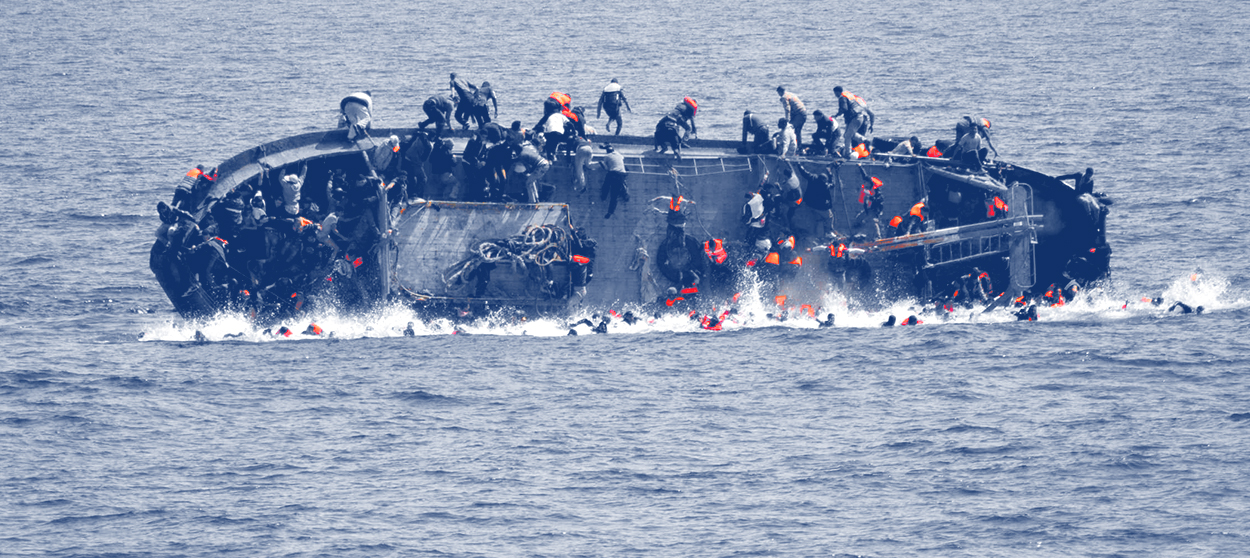The sobering global reality of the immigration crisis
The world's leaders have failed to meet the greatest challenge of our time


A free daily email with the biggest news stories of the day – and the best features from TheWeek.com
You are now subscribed
Your newsletter sign-up was successful
No words are equal to Thursday's news that some 150 migrants perished in a shipwreck off the coast of Libya. Around 140 others managed to survive and were rescued by fishermen and members of the Libyan Coast Guard. According to the United Nations, they had been bound for Italy. Instead, they will return to nightmarish refugee camps back in Libya.
They would not have fared better if they had managed to travel further. The Italian government, under the de-facto leadership of the reactionary interior minister Matteo Salvini, is doing everything in its power to discourage migration — including issuing fines to the captains of ships that bring refugees from North Africa to their shores in search of an escape from famine, poverty, and mindless violence. "Rome, thou art a whole world, it is true, and yet without love this / World would not be the world, Rome would cease to be Rome." U.N. figures suggest that even before Thursday, some 423 migrants had been killed this year attempting to reach the Italian peninsula.
But Italy is not alone in attempting to forestall the progress of refugees. In the past half decade, no issue has been more central to European politics than immigration, and parties that promised to restrict it have won elections and referendums throughout the continent, from Britain to Switzerland to Hungary. The European Union itself has scaled back its participation in search-and-rescue missions throughout the Mediterranean.
The Week
Escape your echo chamber. Get the facts behind the news, plus analysis from multiple perspectives.

Sign up for The Week's Free Newsletters
From our morning news briefing to a weekly Good News Newsletter, get the best of The Week delivered directly to your inbox.
From our morning news briefing to a weekly Good News Newsletter, get the best of The Week delivered directly to your inbox.
Like the current situation on our own southern border, the European migration crisis is a tragedy for which the United States is ultimately to blame. Our disastrous interventions in Iraq, Afghanistan, Libya, Syria, and Yemen have turned North Africa and the Middle East into a hellscape. More than 70 million people worldwide were forcibly displaced from their homes as of 2018 — half of them children — which is more than double the number from 20 years ago. Libya's own internal chaos and its geographic proximity to the ports of Europe have made it the point of departure for asylum seekers throughout the region, who are preyed upon by human smugglers. One in every five migrants who leave its shores die. This is a tragedy of world historic-proportions and probably the most significant development in foreign affairs since the end of the Cold War, if not since 1939.
It is also a crisis for which virtually none of our own leaders have accepted responsibility. The idea that the American foreign policy consensus is largely responsible for the rise of xenophobic nationalist parties throughout Europe seems never to have occurred to the luminaries at the Council on Foreign Relations who wag their fingers at the European far-right. Instead, the imperative to respond to the plight of refugees with moral seriousness has fallen on Angela Merkel, whose humane response to the crisis has reminded us why she is the greatest statesman of our age. She alone has been willing to sacrifice everything — Germany's hard-won post-reunification stability and its vast wealth, her own standing among her colleagues, and ultimately her political career and perhaps even the long-term fortunes of her party — in the name of those immutable values that Christian democracy once offered as a light unto the world amid the ashes of the Second World War.
Those fires are all but extinguished now. In the United States they were never lit. (In this country, Alice Weidel and her ultra-nationalist Alternative for Germany would be considered moderate liberals.) This is a shame, not least because it is America that has inherited the imperial destiny — with both its vast powers and prerogatives and its untold responsibilities — that Merkel once sought to appropriate for the European Union. It is time that we began being more prudent.
It is, in a way, fitting that in Italy we see the most pronounced rejection of the imperial virtues — urbanity, charity, munificence, sacrifice — we ought to be emulating. The nation that stood 2,000 years as a symbol of empire has become a backwater. This cannot be allowed to happen in America, regardless of our failures since 2002, though acknowledging and attempting to atone for them are certainly prerequisites to any meaningful future action. It is absurd that the nation currently hosting the largest number of migrants relative to its population is Lebanon, where one in six people are refugees, followed by Jordan and Turkey.
A free daily email with the biggest news stories of the day – and the best features from TheWeek.com
Munificence is the truest measure of strength.
Matthew Walther is a national correspondent at The Week. His work has also appeared in First Things, The Spectator of London, The Catholic Herald, National Review, and other publications. He is currently writing a biography of the Rev. Montague Summers. He is also a Robert Novak Journalism Fellow.
